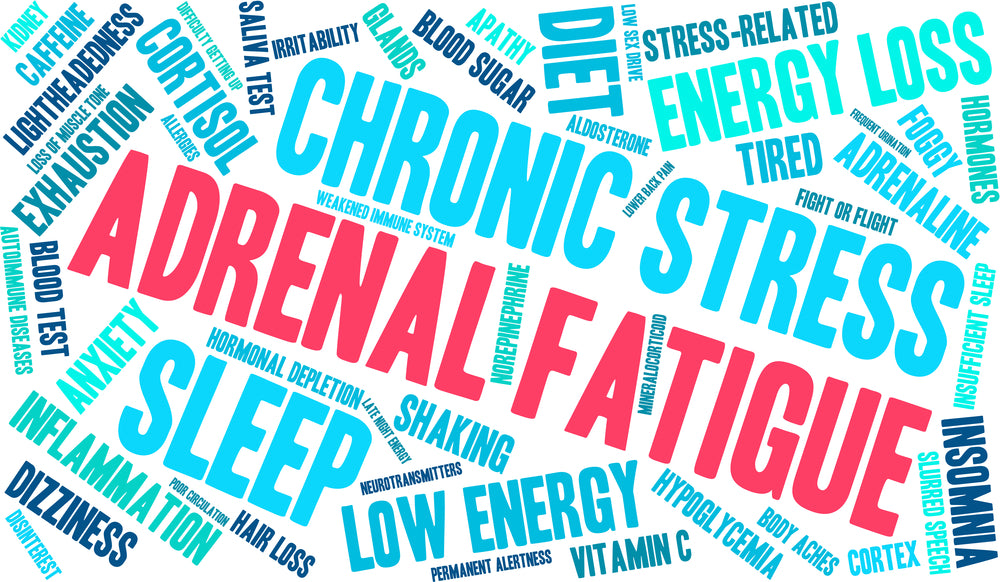How to Lower Cortisol: Lose Weight, Reduce Stress, and Fight Irritability
Hey there! Since you found this guide on lowering cortisol, we assume you’re just like us: you’ve had ENOUGH! Enough of letting every little thing trigger you. Enough of lashing out at loved ones. Enough of gaining weight no matter what you do.
Lowering cortisol is not nearly as hard as you think it is. We did it and so can you. Follow our advice and you’ll start noticing more stable emotions, a thinner belly, and more energy and productivity in no time at all.
High Cortisol Symptoms - Are You Feeling Stressed, Anxious, and Irritable All the Time?
Is it getting harder and harder to get through the day? Does the slightest traffic infraction send you over the top (nice blinker, A******!)? It could be chronic stress from high cortisol.
Symptoms of high cortisol levels include:
Other symptoms include:
These are all telltale signs that your cortisol levels are too high too often. Overexposure to stressful situations keeps you on high alert and interferes with everything from your immune system to your metabolism and physiology. It can even lead to serious long-term diseases like diabetes.
If you bring your cortisol levels back down to Earth, you’ll enjoy reduced stress, improved mood, and more focus. That means a better looking you in the mirror, no more lashing out for no reason, and improved productivity at work.
First, let’s cover the link between fighting extinct mammals and yelling at that out-of-state driver on the highway.
Did You Know?: Short-term exposure to adrenaline in stressful situations can create highly emotional, “flashbulb” memories of highly stressful events. It’s theorized that this is to help you avoid similar situations in the future. Fascinating!
High Cortisol and Stress: Why Are You So Stressed All the Time?
You know this cushy, comfortable modern world thing we’ve got here? It didn’t always exist. Your body is the product of a kill-or-be-killed environment where every day was a struggle for survival.
Naturally, your body is hardwired to protect you from real or perceived dangers. When you encounter a predator or rival tribe (these days that’s traffic or a barking dog), it sets off your body’s protective “alarm system” and releases a flood of adrenaline and cortisol to keep you alive.
Adrenaline gets your heart racing and floods your body with energy. Cortisol affects everything from your blood glucose levels to your mood, energy, and blood pressure, and it’s responsible for shutting off non-essential bodily functions in a fight.
Basically, cortisol and adrenaline help you evaluate the threat and give you the energy you need to either fight that growling sabertooth tiger (or Chihuahua) or “nope” out of there before you’re dinner.
OK, so if you aren’t fighting extinct mammalian predators anymore, why is there a problem? The thing is, the stress of the modern world is actually EVEN WORSE than fighting a predator from time to time, and you’ll never believe how every little thing you’re exposed to every day sends your stress-response system into disarray.
How the Modern World Sends Your Stress Response Haywire

Your body’s natural stress response is normally self-regulating. The alarm system is triggered, you respond to the threat, and once it passes, you slowly come down and return to equilibrium. But if your brain constantly perceives threats, that system is on 24/7. Instead of being chill and only stressed when your life depends on it, you’re now in a state of chronic stress from media, work, your diet, and personal relationships, meaning you’re always on alert and looking for a reason to fight or run.
In the modern world, there is no time to chill and come back down. You’re constantly under pressure to do more at work, you worry about feeding your family, you’re inundated with fake news (in 2019, vaccines now cause disease), and you’re affected by factors you can’t control (traffic, politics, etc.).
That means stress is ALWAYS PRESENT no matter what you do. When you’re always in fight-or-flight mode, you start overreacting to even the tiniest triggers like moderate traffic, an offhand comment from your partner, or a flooded email inbox.
This can start to negatively affect everything from your job to your marriage. It can even change the very fiber of your being.
Do you have trouble sleeping? Chronic exposure to cortisol may have changed the fundamental rhythms controlling your sleep, preventing you from getting the regenerative sleep you need to balance your mood, stay energetic, and fight off aging.
Check this out...
Cortisol and Sleep: “Why Can’t I Get Deep, Relaxing Sleep?”

Having trouble falling asleep? Sleeping 8 hours but still waking up feeling groggy and moody? Maybe you’re dead tired but as soon as your head hits the pillow your brain starts asking “WHAT AM I DOING WITH MY LIFE?!?” Too much cortisol in the bloodstream makes it hard for you to fall asleep, and sleep deprivation leads to moodiness, fatigue, brain fog, and worse.
How to start feeling like a morning person: Check out our guide on magnesium and sleep to balance your magnesium intake and start getting deep, restful sleep.
So get this—your cortisol levels should follow a natural arc. They should be highest an hour or two after you wake up, elevating your testosterone and giving you the energy you need to take on the world and conquer that overstuffed inbox. Then, they should decrease at night, helping you relax and drift off to dreamland where you’ll meet supermodels you have zero chance with.
But, when there’s no variation in cortisol (because you’re always stressed), your hormones, body, and brain don’t know what to do or what time it is. Instead of following a natural rhythm and sleeping in the evening, you start laying in bed with racing thoughts, waking up in the middle of the night, or never achieving deep sleep.
Decreasing your cortisol levels, or, more importantly, restoring this natural rhythm, is key to achieving deep, restful sleep, and waking up not wanting to kill everyone.
Don’t take our word for it; listen to this extremely smart woman at a prestigious university. Tell them how it is, Em’:
“Cortisol is naturally high in the morning to help perk you up, and it decreases into the evening. The loss of this cycle—or the lack of variation of cortisol—is what is associated with negative health outcomes in our study.”
How to Lower Cortisol - Reduce Stress, Improve Mood, and Lose Weight With These Tips

You can lower cortisol levels naturally through a combination of diet, exercise, and lifestyle changes. There are even supplements that are scientifically proven to help optimize cortisol levels. You can lower your cortisol levels by:
We bet you’re a bit skeptical. It’s understandable. We were too. You mean, stuffing my face with dark chocolate, putting on Justin Bieber, and petting my dog can balance cortisol in my bloodstream AND improve my quality of life?
Get this: It works, and science has proven it. We’ve been doing it for years and feel GREAT. Personally, our thoughts don’t race anymore, we don’t lash out at every little minor thing, we wake up feeling refreshed (OK, we still drink too much coffee), and we don’t feel too shy to speak in social situations.
Here’s what science says about these tips:
#1 - Optimize Your Sleep
Sleep debt can ruin your life (almost as much as student debt). Disrupted circadian rhythms due to poor sleep habits increase cortisol secretion and diminish the healing powers of sleep [7]. It’s a vicious cycle. Sleep loss is also associated with increased levels of cortisol the next evening [8].
Here’s how to fall asleep faster, stay asleep longer, and wake up feeling refreshed even if you think you’re an insomniac:
#2 - Exercise Moderately

That hour in the gym won’t just boost your Tinder score. It’ll help restore the variation your body desperately needs to get its cortisol levels back to normal. Like we said before, cortisol increases after exercise to varying degrees, but decreases at night. Even intense exercise still leads to cortisol decrease the following night [14].
The benefits of exercise are exponential. You’ll support healthy cortisol production and sleep better, which also leads to healthier cortisol production and better mood, focus, and energy.
Hit the gym.
#3 - Relax

Never ever, under any circumstances, tell someone to “relax”... except in this blog post where scientific evidence has proven relaxation and therapy lead to decreases in cortisol levels. Various enjoyable relaxation techniques have a major impact on reducing stress and cortisol in the bloodstream.
Bonus: You can fight high cortisol anywhere at any time using the deep breathing technique. Start by sitting up straight and breathing in deeply through your nose. Put one hand on your stomach and the other on your chest. Concentrate only on your breathing. Inhale slowly and exhale deeply. This relaxation hack helps chill us out when we’re feeling stressed, and you can do it anywhere!
#4 - Try to be Happier

Sadness, anxiety, and depression engulf you in negativity don’t let go easily. They’re like a tight straitjacket tightened across your heart and soul (woah, that was dark). Happiness, on the other hand, results in reduced cortisol levels, improved heart health, increased immunity, and better mood [19].
More social connectedness, perceived social support, and optimism are wrenches that break your cortisol-increasing cycle of negativity. Here are a few ways to start being happier NOW (finish this article first though. We worked all week on it).
#5 - Practice Mindfulness

Do you ever notice that you create more stressful thoughts just by thinking you’re the victim rather than an observer of them? It’s not always possible to prevent stressful thoughts, but mindfulness is one way to put them in perspective.
Think about the last time you sent a text and didn’t get a response. What did you think? You probably thought something was wrong or that the worst possible outcome would happen (that person got hurt or a date is flaking on you).
Instead of becoming immersed in runaway negative thoughts, pay attention to what is actually occurring in the present moment: your desire for a reply. Mindfulness is related to long-term changes in the construction of the brain [22], and studies have shown that people who can recognize stressful thoughts and formulate a deliberate response to them benefit from a reduction in cortisol levels [23].
#6 - Adopt a Pet Doggo

Did you know that the four-legged canine running around your home can do other things besides getting you Instagram likes and helping you find romantic partners?
There’s a dog’s house worth of scientific evidence showing that dogs decrease stress and cortisol [24].
In one AWWWW-inducing study [25], children undergoing a minor medical procedure exhibited significantly less distress when paired with a dog in the room compared to those that didn’t.
#7 - Eat Foods that Reduce Cortisol
You never want to eat your emotions, but the best weapon against stress and high cortisol could be a trip to the grocery store. In fact, science is starting to prove that you can eat stress away. You even get to eat chocolate!
Vitamin C especially has proven to reduce stress and anxiety [26].
Make sure these cortisol fighting foods are on your next grocery list:
So, there are foods that help decrease cortisol. Are there any that increase it?
YES!
Sugar has proven to increase stress and lead to tooth decay, obesity, and low mood. It also significantly increases cortisol secretion [31]. So skip that soda next time unless you want a free refill of cortisol in your bloodstream.
How to Lower Cortisol Levels FAST
The best way to lower cortisol fast is to focus on the factors that are immediately within your control: sleep, exercise, and diet. There is no cure-all for high cortisol levels. Elevated levels of this stress hormone are the result of chronic stress built up over your lifetime. There’s no way to get rid of it overnight.
However, exercising moderately during the day, focusing on healthy, vitamin C-rich foods, and doing everything you can to get better sleep are the best ways to reduce your cortisol levels fast.
Sorry, but there is no super fast cure for what you’re going through. We totally understand where you’re coming from—you’re tired of letting chronic stress control your life and prevent you from being social, achieving your goals, and being happy. We went through the same thing. We were scared to talk in front of our best friends, always lashing out at even the slightest annoyance, and slowly noticing our jeans didn’t fit anymore no matter what diet we tried.
That’s when we discovered two incredible supplements that have been used since ancient times for relaxation, healing, and weight control. And this isn’t some faith healing placebo effect like you’re used to. These are the only scientifically proven supplements to reduce cortisol levels.
CortiTrax™: The Best Supplement to Lower Cortisol Levels
Science may have found the optimal blend of all-natural supplements for reducing cortisol that rejuvenates your body and mind, helps you get deep sleep, and sheds pounds in as little as a few weeks!
CortiTrax™ provides fast-acting stress support and helps optimize healthy levels of cortisol in the blood for lower stress, improved memory, weight management, and sleep/energy support. And unlike most supplements out there, it already has the naturally optimized blend in each capsule and NO artificial ingredients.
It won’t make you a supermodel, zen master, or energizer bunny overnight, but when combined with diet, exercise, and better stress-management habits, it could give your body the extra power it needs to finally achieve your goals. Each capsule is packed with:
Other ingredients include:
